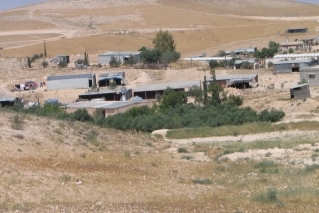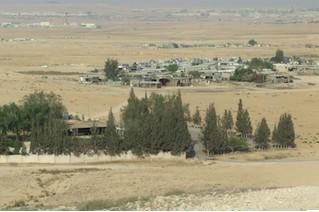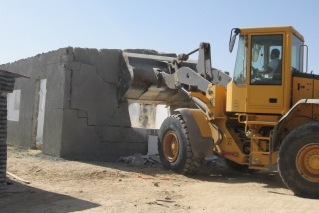 An unrecognized village, photo by Sliman Abu Zaid
An unrecognized village, photo by Sliman Abu Zaid
Government Resettlement Plan for Negev Bedouin: What Happens Next?
As the opening of the Knesset’s winter session draws near, we are focusing on one of the major human rights issues that we expect will come up in the coming months – the government’s plan to resettle the Negev Bedouin.
What is expected during the Knesset’s upcoming winter session?
On October 14, 2013, the Knesset’s summer recess will come to end and the winter session will begin. During this session, the Prawer-Begin plan is expected to be aggressively promoted by the government via two parallel tracks.
1) The Bill for the Regulation of Bedouin Settlement in the Negev (2013) is expected to be brought up for discussion in the Knesset’s Interior Affairs Committee, headed by MK Miri Regev (Likud Beiteinu). Once it passes the committee stage, the bill can be brought to the Knesset plenum for its second and third readings. (For a summary of the bill’s different provisions click here.)
2) At the same time, the Special Planning Authority – established especially for this purpose (through the Headquarters for Economic and Community Development of the Negev Bedouin in the Prime Minister’s Office) – will continue to advance the planning of the Bedouin resettlement program on the basis of the criteria established by the Begin-Prawer plan.

An unrecognized Bedouin village in the Negev (Photo: Ronit Sela)
Why is the Begin-Prawer plan problematic?
For a comprehensive explanation of the problems with the Begin-Prawer plan, read ACRI’s in-depth position paper, prepared together with Bimkom – Planners for Human Rights.
The arrangement regarding Bedouin ownership of Negev land has been unilaterally created without sufficient input by the people it affects, it is completely arbitrary and it is a violation of the Bedouin’s land rights. The government designed the plan without conducting an honest, and open dialogue with the Bedouin and in opposition to their views. We believe that any arrangement must be arrived at through dialogue and based on a mutual trust.
With regards to the planning process, the government plan creates unequal and discriminatory planning principles that apply only to the Bedouin population. The plan attempts to concentrate Negev Bedouin into a pre-determined area by transferring tens of thousands of people (between 30,000 as claimed by the state and 40,000 as claimed by a number of NGOs) from their homes into existing towns (either the seven townships or the villages that have been recognized as a part of the Abu Basma Regional Council) or new villages that will be especially established. This is to occur at the same time as their historical villages, some of which existed before the establishment of the state, are being destroyed. We believe that the State of Israel must recognize the 35 unrecognized Bedouin villages as they are, and devise plans to further develop them.
To read ACRI and Bimkom’s Joint Position Paper on the Government’s Plan, click here.
What does the Bill for the Regulation of Bedouin Settlement in the Negev (2013) actually say?
The bill deals with the establishment of a mechanism for clarifying and regulating land ownership claims in the Negev, and determining the details of arranging the ownership of the land. This includes what land will be included in the arrangement, compensation in respect to land claims, how and when will the compensation be provided, etc.
For an explanation of each of the different provisions contained in the bill, click here.
Why is the Bill problematic?
Among other reasons, it becomes clear by reading the bill that:
- This is a unilateral land arrangement stemming from erroneous premises,
- The bill and its regulations undermine both human rights and property rights and include arrangements that can be considered collective punishment.
- The bill entails the destruction of homes and entire communities that will irreversibly damage this community’s lifestyle.
A consequence of the passage of this bill will be to deepen the rift and entrench the lack of trust between the Bedouin community and the State. This is as opposed to the promotion of a just, historic and constitutional arrangement that would finally bring about a resolution for the discrimination and neglect suffered by Negev Bedouin for years.
For an in-depth analysis, read ACRI and Adalah’s joint position paper outlining why the bill, in the formulation approved by the government, is so problematic.
What’s the alternative to the Prawer-Begin plan?
We believe that any Bedouin resettlement or economic advancement plan should be based primarily on the recognition of the unrecognized villages. They should receive proper town planning and new infrastructure should be invested in. This would go some way to alleviating the injustices resulting from past discrimination against this group.
Planning:
We believe that the state has a responsibility to recognize the 35 unrecognized villages as they stand and should plan and develop them accordingly. A key demand of interested groups is that town planning be conducted according to accepted principles equally applicable to all groups. In order to illustrate this concept – the Negev today contains more than 115 Jewish settlements and 60 individual farms that do not meet the criteria outlined in the Prawer-Begin plan. Not in terms of proximity to other communities, population size or the capacity of the community to ‘support themselves’. Compared to the 35 unrecognized Bedouin villages, there are significantly smaller settlements in terms of the number of residents, many of which exist in particularly dire socio-economic situations. Moreover, the government recently approved the establishment of 11 small new rural settlements designed for Jewish inhabitants that do not meet the criteria outlined in the Begin-Prawer plan. In fact, some of these newly approved settlements are due to be located on the ruins of the demolished villages that the Bedouin are being made to evacuate. There is possible justification for such discriminatorily treatment of the 35 unrecognized Bedouin villages.
Bimkom, The Council of Unrecognized Villages and Sidra have prepared an alternative ‘master plan’ that demonstrates how to conduct proper planning for these villages according to accepted planning principles.
Confidence-building measures:
Any plan must ensure the cessation of home demolitions and the adoption of confidence building measures such as advancing the planning of the unrecognized villages, promoting economic investment, advancing local elections, etc.
Land Ownership:
We believe that all of these steps, taken together, will enable the state in the near future to successfully regulate the issue of Negev land ownership through dialogue and mutual agreements with all relevant parties.

Bedouin house demolitions (Photo: Melanie Takefman)







